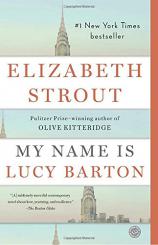Critical Praise
“There is not a scintilla of sentimentality in this exquisite novel. Instead, in its careful words and vibrating silences, MY NAME IS LUCY BARTON offers us a rare wealth of emotion, from darkest suffering to --- ‘I was so happy. Oh, I was happy’ --- simple joy.”
—Claire Messud, The New York Times Book Review
“Spectacular…. Smart and cagey in every way. It is both a book of withholdings and a book of great openness and wisdom…. [Strout] is in supreme and magnificent command of this novel at all times.”
—Lily King, The Washington Post
“A short novel about love, particularly the complicated love between mothers and daughters, but also simpler, more sudden bonds…. It evokes these connections in a style so spare, so pure and so profound the book almost seems to be a kind of scripture or sutra, if a very down-to-earth and unpretentious one.”
—Marion Winik, Newsday
“Potent with distilled emotion. Without a hint of self-pity, Strout captures the ache of loneliness we all feel sometimes.”
—Time
“An aching, illuminating look at mother-daughter devotion.”
—People
“A quiet, sublimely merciful contemporary novel about love, yearning and resilience in a family damaged beyond words.”
—The Boston Globe
“Sensitive, deceptively simple…. It is Lucy’s gentle honesty, complex relationship with her husband, and nuanced response to her mother’s shortcomings that make this novel so subtly powerful…. [It’s] more complex than it first appears, and all the more emotionally persuasive for it.”
—San Francisco Chronicle
“Strout maps the complex terrain of human relationships by focusing on that which is often unspoken and only implied…. A powerful addition to Strout’s body of work.”
—The Seattle Times
“Impressionistic and haunting…[Strout] reminds us of the power of our stories --- and our ability to transcend our troubled narratives.”
—Miami Herald
“Writing of this quality comes from a commitment to listening, from a perfect attunement to the human condition, from an attention to reality so exact that it goes beyond a skill and becomes a virtue.”
—Hilary Mantel



